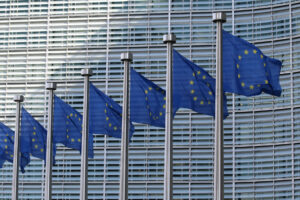 Economic growth is linked to increases in production, consumption and resource use and factually negative effects on the natural environment and human health. It appears improbable that a long-lasting, complete decoupling of economic growth from environmental damage can be achieved at a global scale. Consequently, European states are now reconsidering what is meant by growth and progress and their significance for signalling worldwide sustainability. And just like companies, countries need to adjust their business models from time to time.
Economic growth is linked to increases in production, consumption and resource use and factually negative effects on the natural environment and human health. It appears improbable that a long-lasting, complete decoupling of economic growth from environmental damage can be achieved at a global scale. Consequently, European states are now reconsidering what is meant by growth and progress and their significance for signalling worldwide sustainability. And just like companies, countries need to adjust their business models from time to time.
In light of this, the European Commission analysed the macroeconomic imbalances for 12 member states. The report found out that Greece, Italy and Cyprus were experiencing the most excessive imbalances from all other states. In the case of Cyprus, the economic vulnerabilities relate to high government and private debt, large current account deficits and a high stock of non-performing loans. The good news is that debt ratios declined thanks to a strong 2021 and NPLs declined thanks to large sales to specialised credit acquiring companies.
Still, the Commission noted that Cyprus is currently facing excessive macroeconomic imbalances. The current account deficit remains large and is projected to widen in 2022 – only to deflate somewhat in 2023. Thus is partly because of the ongoing war in Ukraine and the exposure to the Russian economy primarily through the service sector. Government and private debt-to-GDP ratios are expected to further improve, in part on the back of global economic growth making a relevant comeback after the tiresome Covid 19 pandemic.
Cyprus needs a more diverse and environmentally sustainable model for economic growth. State-owned entities must get in line with international standards by reducing overall reliance on fossil fuels and diversifying energy supply by accelerating the deployment of renewables. The state needs to develop its neighbouring energy interconnections while extending and accelerating energy efficiency measures. This includes making the country’s economic growth model more diverse and environmentally sustainable, building on the support of the national recovery and resilience plan and implementing a long-term strategy
The Cyprus’ Recovery and Resilience Plan does include measures such as:
- Create a more effective, efficient and fairer tax system.
- Strengthening financial and fiscal stability to complete a solid banking sector
- Reduce risks related to private debt and improve supervision of the non-banking sector
- It is also necessary to strengthen the legal framework and enforce court decisions.
- Digitalisation of the public sector and the justice system to improve connectivity.
- Work toward improving access to quality healthcare through digital health.
- Increasing the quality of education, digital skills and youth employment.
So just like individuals and companies, countries need to be able to reflect on their growth models and adjust all the relevant operational pillars in order to remain in a growth mind-set. Cyprus’ recovery and resilience plan includes similar pillars as for profit organizations. It includes strengthening financial stability, reducing risks associated with (public or private) debt, improving governance and supervision, and becoming more effective. It includes measures for building a more sustainable business model on a global stage!